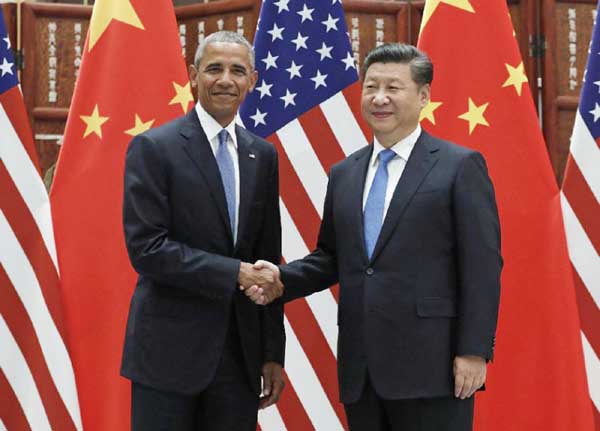
AP, Beijing :
Sidestepping recent disputes over Taiwan and regional security, China said Thursday that “important progress” has been made in its relationship with the U.S. under President Barack Obama and the two countries should move forward as partners rather than competitors.
Asked to sum up relations under Obama, who leaves office Friday, Foreign Ministry spokeswoman Hua Chunying recalled the numerous meetings between the U.S. president and his Chinese counterpart Xi Jinping, including last year in the eastern Chinese city of Hangzhou.
Trade, investment and people-to-people exchanges between the sides all hit new records under Obama, while the countries worked together on climate change, an investment agreement, building trust between their militaries, counterterrorism and the Iranian nuclear issue, Hua said at a daily briefing.
“Important progress has been made by the two countries. This has shown that China-U.S. relations have strategic and overarching significance and we have more common interests than differences and when China and the U.S. work together we can achieve a lot,” Hua said.
China and the U.S need to be “friends and partners rather than competitors and enemies,” Hua said.
Hua made no mention of the long-running dispute over Taiwan, the self-governing island that China claims as its own territory. Washington has robust unofficial relations with the island and provides it with arms to guard against Beijing’s threat to use force to reunify with it.
China on Wednesday called on the U.S. to bar a Taiwanese delegation from attending Donald Trump’s Friday inauguration, underscoring concerns that the incoming president could seek to redefine relations among Beijing, Taipei and Washington.
Trump had already angered Beijing and upset decades of diplomatic precedent by talking by phone with Taiwanese President Tsai Ing-wen shortly after winning November’s presidential election. Last week, he said in a newspaper interview that Washington’s “one-China policy” under which it recognized Beijing in 1979 was open to negotiation, and earlier questioned why the U.S. should be bound by such an approach without China offering incentives.
Beijing and Washington have also tangled repeatedly over China’s assertions of its territorial claims in the South China Sea, including man-made islands equipped with airstrips and military facilities. Missions by U.S. ships and planes to press the right to freedom of navigation in the area have met with angry responses from Beijing, which sees them as part of an effort to restrain its rise as the region’s leading military power.
Other disputes center on U.S. criticism of Chinese trade and investment practices that are seen as unfair, as well as the ruling Chinese Communist Party’s treatment of political and human rights activists and policies toward minority groups in Tibet and the far western region of Xinjiang..

